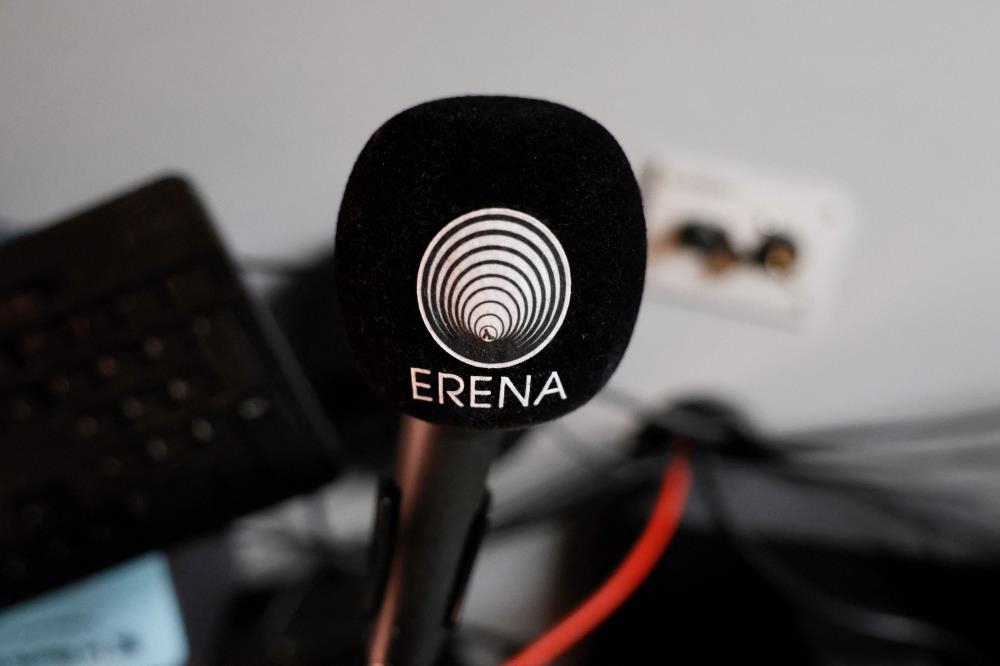
Radio Erena: Eritrea's Voice Of Hope Under Threat
Paris: In Eritrea, one of the world's most repressive countries, a tiny independent radio station broadcasting from a Paris apartment has become a beacon of hope.
Transmitting trusted news for the past 15 years from a studio tucked away in the French capital's 13th district, Radio Erena -- Eritrea's only independent media -- is now under threat and risks going off the air due to lack of funding.
In the span of a year, the Radio Erena team has shrunk from six to three people, including two experienced journalists who fled to France.
"In 2001, the Eritrean government decided to close down all private media," said Amanuel Ghimai Bhata, editor-in-chief of Radio Erena.
"Since then, only the voice of the state has been heard, mainly propaganda."
A handful of media outlets are trying to resist by broadcasting from abroad, the vast majority of them linked to Eritrean political forces. Radio Erena is the only "independent and apolitical" outlet, according to its team.
Radio Erena broadcasts less than two hours of programming a day in Tigrinya and Arabic, Eritrea's two main languages.
Relying on a network of correspondents based outside the country, Radio Erena, which means "Our Eritrea" in Tigrinya, has become a lifeline for audiences back home.
It is difficult to estimate the number of listeners, given the limited access to the country. Germany's Deutsche Welle Akademie said in 2017 that 520,000 people in Eritrea listened to Radio Erena at least once a week, out of a population of around 3.5 million.
Its waves are often jammed, according to Reporters Without Borders which helped found the independent media outlet in 2009.
After three decades of war, Eritrea declared independence from Ethiopia in 1993. The impoverished Horn of Africa nation has only ever been ruled by one man, Isaias Afwerki, 78, who has cracked down on all political opposition.
Sometimes described as Africa's North Korea, it is a "one-man dictatorship" with no legislature, no independent civil society organisations and no independent judiciary, according to Human Rights Watch.
'Totalitarian system'
Eritreans want to know "what's happening on the other side of the world", as well as "outside their borders", particularly in northern Ethiopia where their army has fought alongside Ethiopian federal forces against Tigrayan rebels, said Bhata.
Eritrean troops supporting the Ethiopian government continue to occupy parts of the Tigray region. Hundreds of thousands of people have died and a million others were displaced during the conflict in 2020-2022.
"The Eritrean government is not saying a word about it," said Bhata.
Journalist Amanuel Ghirmaile works on a program recording in the radio studio of Erena Radio Eritrea International on October 31, 2024. (Photo by Gregoire Campione / AFP)
State media outlets provide "a completely illusory image of Eritrea, giving the impression that everything is still fine", said Marc Lavergne of France's CNRS scientific research centre.
"Press freedom is non-existent in Eritrea. Only North Korea is at the same level," the Horn of Africa expert said.
According to this year's Press Freedom Index by Reporters Without Borders (RSF), North Korea ranks 177th out of 180 countries.
Eritrea is ranked last. According to RSF, the country is "notorious for detaining journalists longer than any other country in the world".
Lavergne described Eritrea as an "extremely tightly controlled totalitarian system".
"Only a handful of loyalists to Isaias Afwerki's regime have access to the outside world, the Internet and the international press," he said.
Funding crisis
Over the past years, authorities in Eritrea have sought to disrupt the work of Radio Erena.
In 2012, officials accused the radio station of inciting its listeners to commit "acts of violence against Eritrean government representatives", according to Reporters Without Borders.
"We were unable to broadcast for nearly eight months," said Bhata.
The journalist fled Eritrea in 2009 after working for several years at the ministry of information, where he says he was forced to comply with the "propaganda machine". Even in France he does not feel completely safe, saying he frequently receives online threats.
Maxence Peniguet, director of operations at Radio Erena, pointed to numerous cyber attacks seeking to cripple its operations.
Worst of all, the outlet's funds are drying up.
The financial resources from private donors and US and European NGOs are no longer sufficient to cover the costs, while finding new donors proves "very complicated", given multiplying crises around the world, said Peniguet.
Without fresh funding they would lose "nearly half our budget for 2025", he said, adding he fears that Radio Erena could fall silent "in a few months".

Legal Disclaimer:
MENAFN provides the
information “as is” without warranty of any kind. We do not accept
any responsibility or liability for the accuracy, content, images,
videos, licenses, completeness, legality, or reliability of the information
contained in this article. If you have any complaints or copyright
issues related to this article, kindly contact the provider above.


















Comments
No comment